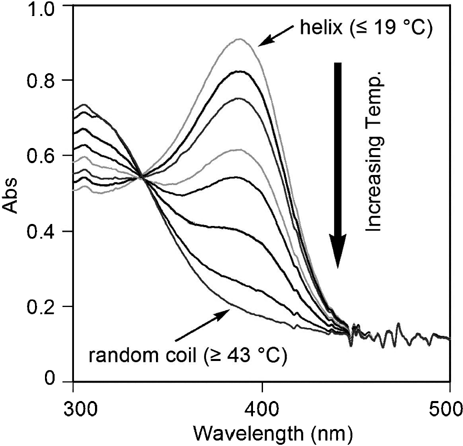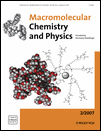The Formation of a Stable, Helical Conformation in Poly(N-propargylamides) through Synergic Effects among their Pendent Groups
Jianping Deng
State Key Laboratory of Chemical Resource Engineering, Beijing 100029, China
College of Materials Science and Engineering, Beijing University of Chemical Technology, Beijing 100029, China
Search for more papers by this authorWeiguo Zhao
State Key Laboratory of Chemical Resource Engineering, Beijing 100029, China
Search for more papers by this authorJianmin Wang
College of Materials Science and Engineering, Beijing University of Chemical Technology, Beijing 100029, China
Search for more papers by this authorZhigang Zhang
College of Materials Science and Engineering, Beijing University of Chemical Technology, Beijing 100029, China
Search for more papers by this authorCorresponding Author
Wantai Yang
State Key Laboratory of Chemical Resource Engineering, Beijing 100029, China
College of Materials Science and Engineering, Beijing University of Chemical Technology, Beijing 100029, China
College of Materials Science and Engineering, Beijing University of Chemical Technology, Beijing 100029, China. Fax: +86 10 6441 6338Search for more papers by this authorJianping Deng
State Key Laboratory of Chemical Resource Engineering, Beijing 100029, China
College of Materials Science and Engineering, Beijing University of Chemical Technology, Beijing 100029, China
Search for more papers by this authorWeiguo Zhao
State Key Laboratory of Chemical Resource Engineering, Beijing 100029, China
Search for more papers by this authorJianmin Wang
College of Materials Science and Engineering, Beijing University of Chemical Technology, Beijing 100029, China
Search for more papers by this authorZhigang Zhang
College of Materials Science and Engineering, Beijing University of Chemical Technology, Beijing 100029, China
Search for more papers by this authorCorresponding Author
Wantai Yang
State Key Laboratory of Chemical Resource Engineering, Beijing 100029, China
College of Materials Science and Engineering, Beijing University of Chemical Technology, Beijing 100029, China
College of Materials Science and Engineering, Beijing University of Chemical Technology, Beijing 100029, China. Fax: +86 10 6441 6338Search for more papers by this authorAbstract
Copolymerization reactions of two N-propargylamides [1: HCCCH2NHCO(CH2)5CH3, 2: (HCCCH2NHCOC(CH3)3] were carried out with different monomer feed ratios. Compared with the two corresponding homopolymers, the series of resulting copolymers poly(1-co-2) had a higher helix content. They also performed very differently in conformational transitions, either from random coil to helix or from helix to random coil, mainly depending on the composition of the copolymers. Synergic effects among the pendent groups played a significant role in the copolymer main chains adopting stable helices.
References
- 1
- 1a G. Tian, Y. Lu, B. M. Novak, J. Am. Chem. Soc. 2004, 126, 4082;
- 1b T. Nishimura, K. Takatani, S. Sakurai, K. Maeda, E. Yashima, Angew. Chem. Int. Ed. 2002, 19, 3602.
- 2 L. Pu, Tetrahedron: Asymmetry 1998, 9, 1457.
- 3 M. Teraguchi, J. Suzuki, T. Taneko, T. Aoki, T. Masuda, Macromolecules 2003, 36, 9694.
- 4
- 4a M. Albrecht, Angew. Chem. Int. Ed. 2005, 44, 2;
- 4b J. J. L. M. Cornelissen, J. J. J. M. Donners, R. de Gelder, W. S. Graswinckel, G. A. Metselaar, A. E. Rowan, N. A. J. M. Sommerdijk, R. J. M. Nolte, Science 2001, 293, 676.
- 5 M. Qin, J. Bartus, O. Vogl, Macromol. Symp. 1995, 98, 387.
- 6
F. Takei,
H. Hayashi,
K. Onitsuka,
N. Kobayashi,
S. Takahashi,
Angew. Chem. Int. Ed.
2001,
40,
4092.
10.1002/1521-3773(20011105)40:21<4092::AID-ANIE4092>3.0.CO;2-R CAS PubMed Web of Science® Google Scholar
- 7
- 7a T. Nakano, Y. Okamoto, Chem. Rev. 2001, 101, 4013;
- 7b Y. Okamoto, T. Nakano, Chem. Rev. 1994, 94, 349.
- 8
- 8a S. Mayer, R. Zentel, Prog. Polym. Sci. 2001, 26, 1973;
- 8b S. K. Jha, K. S. Cheon, M. M. Green, J. V. Selinger, J. Am. Chem. Soc. 1999, 121, 1665.
- 9
- 9a H. Nakashima, M. Fujiki, J. R. Kim, Macromolecules 1999, 32, 7707;
- 9b M. Fujiki, J. Am. Chem. Soc. 1994, 116, 11976.
- 10
- 10a B. S. Li, K. K. L. Cheuk, L. Ling, J. Chen, X. Xiao, C. Bai, B. Z. Tang, Macromolecules 2003, 36, 77;
- 10b R. Nonokawa, M. Oobo, E. Yashima, Macromolecules 2003, 36, 1160.
- 11 C. Nuckolls, T. J. Katz, G. Katz, P. J. Collings, L. Castellanos, J. Am. Chem. Soc. 1999, 121, 79.
- 12
- 12a S. J. George, A. Ajayaghosh, P. Jonkheijm, A. P. H. J. Schenning, E. W. Meijer, Angew. Chem. Int. Ed. 2004, 43, 3422;
- 12b A. Khan, S. Hecht, Chem. Eur. J. 2006, 12, 4764.
- 13
- 13a J. Tabei, M. Shiotsuki, F. Sanda, T. Masuda, Macromolecules 2005, 38, 9448;
- 13b J. Tabei, M. Shiotsuki, T. Sato, F. Sanda, T. Masuda, Chem. Eur. J. 2005, 11, 3591;
- 13c J. Tabei, R. Nomura, M. Shiotsuki, F. Sanda, T. Masuda, Macromol. Chem. Phys. 2005, 206, 323;
- 13d R. Nomura, J. Tabei, T. Masuda, Macromolecules 2002, 35, 2955;
- 13e R. Nomura, J. Tabei, T. Masuda, J. Am. Chem. Soc. 2001, 123, 8430.
- 14
- 14a J. P. Deng, J. Tabei, M. Shiotsuki, F. Sanda, T. Masuda, Macromolecules 2004, 37, 7156;
- 14b J. P. Deng, J. Tabei, M. Shiotsuki, F. Sanda, T. Masuda, Macromolecules 2004, 37, 5149.
- 15
- 15a J. P. Deng, J. Tabei, M. Shiotsuki, F. Sanda, T. Masuda, Macromolecules 2004, 37, 1891;
- 15b J. P. Deng, J. Tabei, M. Shiotsuki, F. Sanda, T. Masuda, Macromol. Chem. Phys. 2004, 205, 1103.
- 16 R. R. Schrock, J. A. Osborn, Inorg. Chem. 1970, 9, 2339.
- 17
M. Tabata,
T. Some,
Y. Sadahiro,
Macromol. Chem. Phys.
1999,
200,
265.
10.1002/(SICI)1521-3935(19990201)200:2<265::AID-MACP265>3.0.CO;2-6 CAS Web of Science® Google Scholar
- 18 J. P. Deng, J. Tabei, M. Shiotsuki, F. Sanda, T. Masuda, Macromolecules 2004, 37, 9715.





